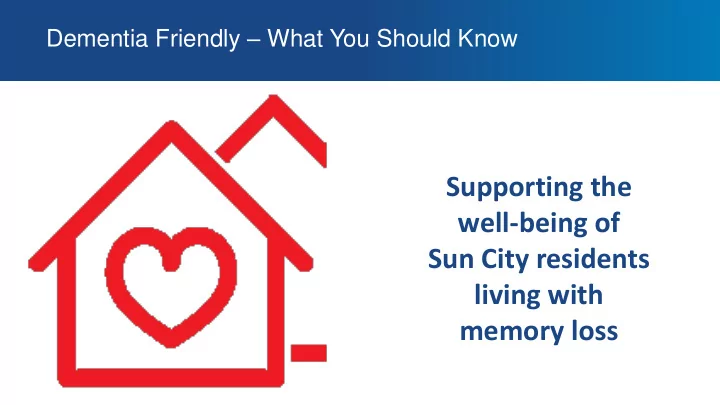

Dementia Friendly – What You Should Know Supporting the well-being of Sun City residents living with memory loss
Understand the Terms Dementia An umbrella term describing a collection of symptoms caused by disorders affecting the brain. It is not one specific disease. Affects thinking, behavior and the ability to perform everyday tasks. Brain function is affected enough to interfere with normal social or working life. Fronto Temporal Lewy Body Alzheimer’s Vascular Dementia Dementias Disease Dementia - Fourth most - Third most - Most common - Second most common common common, with - 40-70% of all - 2-20% of all sudden onset - 2-20% of all dementias dementias dementias - Likely starts - 15-25% of all - Hallucinations Other 10+ years dementias - Parkinson’s before - Stroke related Dementias like, hunched memory or Dementias associated over cognitive with CTE, Parkinson’s - More problems, disease, Huntington common in progressive disease, head trauma, males decline HIV, Crutzfeldt-Jakob Disease, etc.
Normal Aging vs Alzheimer’s Disease Normal Aging Early Signs of Dementia Cognition Cognition ● Sometimes forgetting names, remember them later ● Memory loss that disrupts life ● Confused on day of week, but recall it later ● Confusion with time or place or names ● Misplacing things but finding them later ● Misplacing things and no ability to retrace steps ● Occasional errors balancing checkbook ● Difficulty completing familiar tasks at home or leisure ● Need occasional help with remote control / microwave ● Challenges in planning or solving problems ● Sometimes trouble finding right word ● New problems with words in speaking or writing ● Making a bad decision once in a while ● Decreased or poor judgment Physical Physical ● Vision changes related to cataracts ● Trouble understanding visual images & spatial relationships Behavioral Behavioral ● Sometimes feeling weary of work, family, social ● Withdrawal from work/social activities ● Upset or irritable when a routine is disrupted ● Changes in mood & personality ● Wandering
Wandering It is estimated that more than 50% of people will wander at some point, presenting a unique challenge to a senior community Symptoms Indicators Wandering has a purpose – the majority of people who wander Inappropriate clothing for the weather become disoriented while they are going about their routine activities. Inappropriate social behavior for the setting Most do not consider themselves “lost”. They are responding to an unmet basic need (hunger, thirst, toileting, pain, fear ). Can’t seem to navigate crosswalk or sidewalk The diseased brain is unable to recall familiar surroundings or routes. Dementia changes a person’s ability to think clearly, Aimlessness recognize persons, landmarks, or other familiar objects and are unable to problem-solve or identify themselves and may display poor situational or contextual awareness because their Walking in the street or side of the road mind is not logical and they are lost both physically and mentally. Seems to have trouble interacting with those around him/her
Responding to Wandering Challenges in identifying a person with dementia • May seem coherent and oriented in casual conversation (good social skills can mask underlying issues) • May seem to be on their way to a routine outing • Can be aware of their memory loss and try to have casual conversation that is devoid of real information Question: What is your name, sir?” Their Answer: Oh, didn’t I tell you that already?” Common reactions of people with dementia: • Limited ability to understand situation, becoming overwhelmed or frustrated • May exhibit fear-based impulsive behavior • Exaggerated responses, outbursts, screaming or unprovoked violence
Responding to Wandering Assess the situation - keep person safe, engaged, and establish their identity/emergency contact information Introduce yourself. Ask them their name. Ask and explain before touching. Ask basic evaluation questions: Where are you coming from? Where are you going to? Who are you meeting? Listen for frustration , provide reassurance (You’re safe here, I’m sorry you are upset) Observe if they have ID bracelet, GPS bracelet or identification in wallet or purse Assume standard safety protocols, be prepared for common reactions Call for back up Key Learnings: Create calm environment, remove stimulation and background distractions Don’t argue with the person, distract and redirect by asking for help with task Repeat what they say / affirm responses
Vikki Hunley 704-909-2070 Vikki.Hunley@TheIvey.com www.TheIvey.com
Recommend
More recommend